Coming Together Against Domestic Violence
Defining Domestic Violence and Abuse
Domestic violence is the willful intimidation, physical assault, battery, sexual assault, and/or other abusive behavior as part of a systematic pattern of power and control perpetrated by one intimate partner against another.
- It includes physical violence, sexual violence, threats, and emotional/psychological abuse.
Abuse includes physical, sexual or emotional/psychological attacks ranging from mild to lethal.
Ask yourself whether your intimate partner has done any of the following to you, if so, then you've been subjected to abuse:
Physical Abuse
| Sexual Abuse
| Emotional Abuse
|
|---|---|---|
pushed or shoved you
| told anti-women jokes or made demeaning remarks about women
| ignored your feelings
|
held you or kept you from leaving
| treated women as sex objects
| ridiculed or insulted women as a group
|
slapped or bit you
| been jealous/angry, assuming that you would have sex with any available man
| ridiculed or insulted your most valued beliefs (religion, race, heritage, class)
|
kicked or choked you
| insisted you dress in a more sexual way than you wanted
| withheld approval, appreciation or affection as punishment
|
hit or punched you
| minimized the importance of your feelings about sex
| continually criticized you, called you names or shouted at you
|
thrown objects at you
| criticized you sexually
| insulted or drove away your family or friends (isolation)
|
locked you out of the house
| called you sexual names, like "whore", "frigid", etc.
| humiliated you in public or private
|
abandoned you in dangerous places
| forced you to strip when you didn't want to
| refused to socialize with you
|
refused to help you when you were sick, injured or pregnant
| publicly showed sexual interest in other women
| refused to work or share money
|
subjected you to reckless driving
| had affairs with other women after agreeing to a monogamous relationship
| took car keys or money away
|
raped you
| forced sex with him or others or forced you to watch others
| regularly threatened to leave or told you to leave
|
threatened or hurt you with a weapon
| forced particular unwanted sexual acts
| threatened to hurt you or your family
|
forced sex after beating
| punished or deprived the children when he was angry with you
| |
forced sex when it was a danger to your health
| threatened to kidnap the children if you left him
| |
forced sex for the purpose of hurting you with objects or weapons
| abused pets to hurt you
| |
committed sadistic sexual acts
| told you about his affairs
| |
harassed you about affairs he imagined you were having
| ||
manipulated you with lies and contradictions
|
This list could extend to countess pages. Also, it is more difficult to put them in order of less damaging to more damaging behavior due to the subtleties. Furthermore, frequency can make them mere slights or devastating humiliations.
Red Flags of Abuse and Domestic Violence
My father was one of those men who sit in a room and you can feel it: the simmer, the sense of some unpredictable force that might, at any moment, break loose, and do something terrible. [Burnside, p. 27]
— John Burnside, A Lie About My Father: A Memoir15 Warning Signs of an Abuser
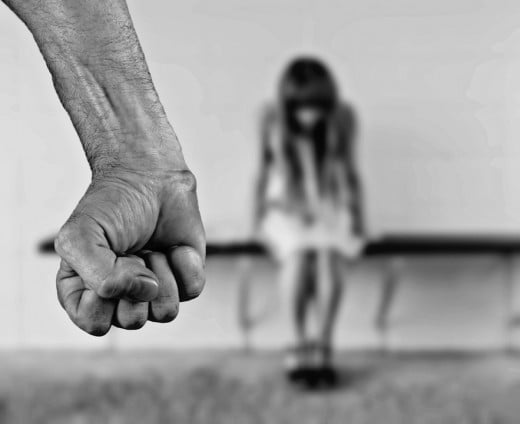
Did You Know?
- In the United States, an average of 20 people are physically abused by intimate partners every minute. This equates to more than 10 million abuse victims annually.
- 1 in 3 women and 1 in 4 men have been physically abused by an intimate partner.
- 1 in 5 women and 1 in 7 men have been severely physically abused by an intimate partner.
- 1 in 7 women and 1 in 18 men have been stalked. Stalking causes the target to fear she/he or someone close to her/him will be harmed or killed.
- On a typical day, domestic violence hotlines nationwide receive approximately 20,800 calls.
- The presence of a gun in a domestic violence situation increases the risk of homicide by 500%.
- Intimate partner violence accounts for 15% of all violent crime.
- Intimate partner violence is most common among women between the ages of 18-24.
- 19% of intimate partner violence involves a weapon.
Domestic violence matters because it's prevalent in every community, and affects all people regardless of age, socio-economic status, sexual orientation, gender, race, religion, or nationality.
Quick Question
Have You Heard of Domestic Violence Awareness Month (DVAM)?
The more that we choose not to talk about domestic violence, the more we shy away from the issue, the more we lose.
— Russell WilsonRussell Wilson Launched ‘Pass The Peace’ Campaign To Help Domestic Violence Victims

There Are 44 NFL Players Who Have Been Accused of Sexual or Physical Assault
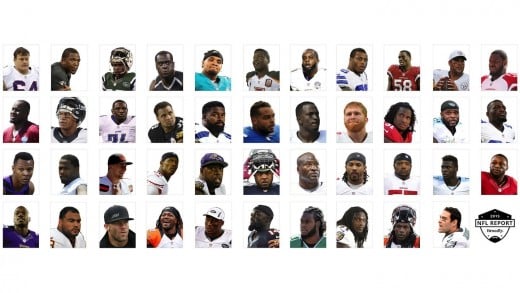
Domestic Violence on College Campuses
- Domestic Violence on College Campuses
An overview of the scope of the problem of dating and domestic violence on college campuses.
#MeToo: Social Media Advocacy Campaign
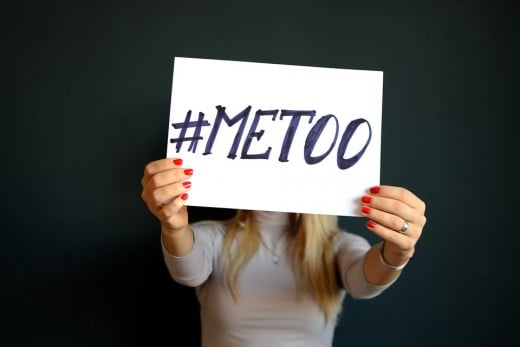
5 Things You Can Say to a Domestic Violence Victim
If you know someone who is reluctant to leave or is returning to a violent relationship, then try saying the following, which may motivate them to change their thought process on the situation:
- "I am afraid for your safety."
- "I am afraid for the safety of your children."
- "It will only get worse."
- "I am here for you when you are ready to leave."
- "You deserve better than this."
She could just pack up and leave, but she does not visualize what's beyond ahead.
— Núria AñóWhy It May Be Hard For Women To Leave
There are various reasons why women choose to remain in a violent relationship.
One reason is economic dependence. For example, the woman may not have the means or ambition to support herself or her children (e.g., unable to be self-sufficient due to lack of education or income).
Parenting is another reason. Perhaps the woman would prefer to have a father figure for the children regardless of their violent behavior.
Religion often pressures women to keep their families together too (e.g., Hinduism places a very high value on marriage and does not approve of divorce and many Catholics feel it's their spiritual duty to stay because their marriage vows stated "until death do us part").
Role confusion also factors into why women choose to stay in violent relationships. They may have learned that this is just the way men act due to societal, social-peer, or child/family exposure.
Some women stay due to fear of being alone; they may fear that they cannot solely maintain their home and children. Personal security is another reason; perhaps she fears her neighborhood.
Other women stay out of loyalty or pity (e.g., they feel sorry for their abusers, especially if they've become ill -- caregivers).
Also, women often suffer from the "rescue complex"; they feel if they stay together, then they can "save" their abusers and help them get better.
Fear of suicide is a huge factor that forces women to choose to stay in violent relationships. Abusers often threaten to kill themselves if their victims choose to leave.
Denial and blind optimism also factor into why women stay; many domestic violence victims do not think the abuse is that bad or they think that their abusers are really a good people who will change on their own in due time.
Other factors as to why women choose to stay in violent relationships include responsibility, shame, embarrassment and humiliation.
Regarding domestic violence, many women have a hard time overcoming the "superwoman" complex in that they feel it is up to them to work things out and save their relationship alone. Therefore, they would rather others remain blissfully unaware of what is happening to them. This involves much secrecy and points to their possible need for security (i.e., a woman who grew up with the idea of the "American Dream" may encounter great difficulty leaving her "happily ever after" lifestyle even if she is painfully aware her dream has turned into a nightmare).
Love is a major factor, which hinders women from leaving and keeps the Cycle of Violence in motion. Abusers are particularly loving and lovable when they are not being abusive and this immensely confuses their victims.
The Cycle of Violence
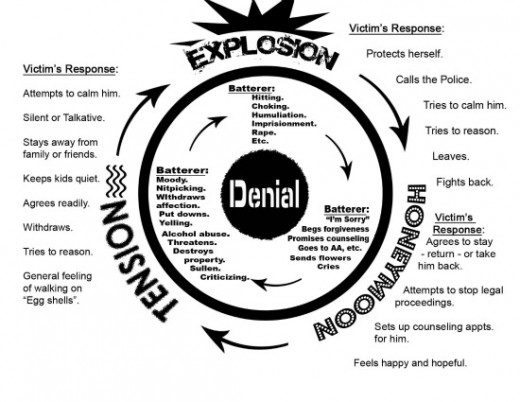
An abuser can seem emotionally needy. You can get caught in a trap of catering to him, trying to fill a bottomless pit. But he’s not so much needy as entitled, so no matter how much you give him, it will never be enough. He will just keep coming up with more demands because he believes his needs are your responsibility, until you feel drained down to nothing.
— Lundy Bancroft, Why Does He Do That?: Inside the Minds of Angry and Controlling MenWhat Lessons Do Children Learn From Growing Up In Domestically Violent Households?
- Violence works: children view violence/abuse as the solution to problems rather than a problem in and of itself.
- They learn the safest place for them (the child) is in the arms of the abusive parent.
- They learn that violence/abuse reinforces power.
- They learn that fear is the emotion which permeates a relationship and governs interactions.
- They learn to react, not initiate (more co-dependent)
- They learn that intensity determines recognition; they have difficulties recognizing low-level emotions.
- They learn to focus on the weaknesses of others.
- They learn negative and rigid gender roles and identification.
- They learn that compassion, empathy and gentleness are signs of weakness.
Impacts Of Domestic Violence On Children’s Health
- Impacts Of Domestic Violence On Children’s Health
Family Dynamics of Domestic Violence and the effects on children's well being.
How Domestic Violence Affects a Child's World
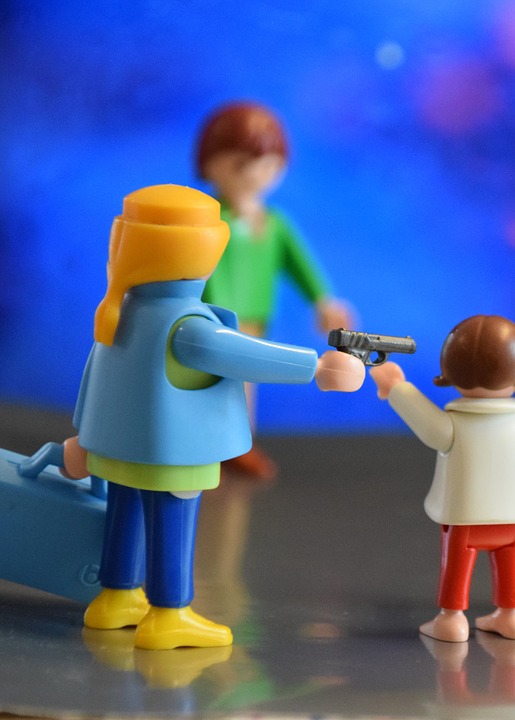
The boys had always been her reason to stay, but now for the first time they were her reason to leave. She'd allowed violence to become a normal part of their life.
— Liane Moriarty, Big Little LiesCommon Questions About Leaving
Many domestic violence victims ask the following questions about leaving.
Can I take my children with me when I leave?
- Yes. If you can do it safely, definitely take your children with you. It may be more difficult later.
- Get legal custody of them within a few days. This is very important.
- If you do not have your children with you, it may be difficult filing for temporary custody of your children. The parent who has physical possession of the children may have an advantage getting temporary custody.
- Your partner may try to kidnap, threaten or harm the children in order to get you to return.
- If you are in immediate danger and cannot take your children, contact the police immediately to arrange for temporary protective custody. (This does not mean you will lose custody. Permanent custody will be decided by a judge.)
Where do I go?
- Stay with a friend or relatives.
- If you are a woman, do not stay with a man unless he is a relative. (Living with a man you are unmarried to could hurt your chances of getting custody of your children and spousal support. It could also cause conflict with your abuser.)
- Go to a domestic violence shelter with your children. The staff there will help you get legal and financial help, in addition to counseling and emotional support for you and your children.
- Or call 911 because it is a good start.
Your life and your safety are paramount. Trying to bring your children with you is important. Everything else is secondary.
It's Complicated
Don't play his game. Play yours.
— Rachel Caine, Fall of NightKnow Your Rights
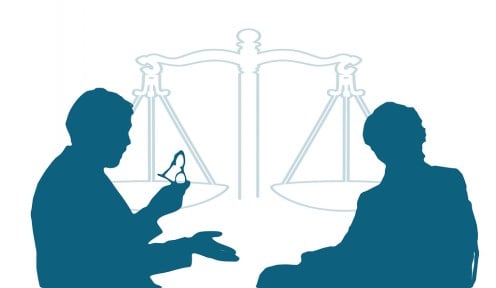
ICYMI: Everyone Has Basic Relationship Rights
In best-selling classic, The Verbally Abusive Relationship by Patricia Evans, the basis rights in a relationship are stated as follows:
- The right to good will from the other
- The right to emotional support
- The right to be heard by the other and to be responded to with courtesy
- The right to have your own view, even if your mate has a different view
- The right to have your feelings and experience acknowledged as real
- The right to receive a sincere apology for any jokes you find offensive
- The right to clear and informative answers to questions that concern what is legitimately your business
- The right to live free from accusations and blame
- The right to live free from criticism and judgment
- The right to have your work and your interests spoken of with respect
- The right to encouragement
- The right to live free from emotional and physical threat
- The right to live free from angry outbursts and rage
- The right to be called by no name that devalues you
- The right to be respectfully asked rather than ordered
Never let a man put his hands on you without your permission.
— Melda Beaty, LimeWays You Can Help Victims of Domestic Violence
Listen to them. Let them know you care; show that you are willing to listen without trying to extract information they are not ready to share. Take their concerns, feelings, and fears seriously; never discount or minimize them. Never blame them for their situation; help them to realize that everyone is accountable for their own actions and that nothing they may have said or done deserves or excuses abuse of any kind. Violence is never an appropriate response to any situation.
Let them make their own decisions. It is empowering to know that someone trusts your judgement and believes in your ability to find solutions to the problem. Trust them to make the right choices for themselves; tell them you respect their courage and their determination.
Encourage and help them develop a safety plan. Agree with their concerns for their safety, in addition to that of their children. Offer your assistance in developing a plan that may even include you. Have them look ahead to a plan of action should the abuser become violent again. Suggest that they have an "escape bag" somewhere that may include an extra set of car keys, ID documents birth certificates, insurance cards, etc. in case they need them.
Encourage them to break the isolation. One of the most effective "tools" abusers use is isolation from family, friends, co-workers, church friends, or any type of support system. Assist them in finding an agency that offers counseling and support groups free of charge to the victim. Make them aware of how isolated they are.
Encouraging them to take take seriously. Express your concern for their safety and never minimize threats made by the abuser. Remember, however, that the most dangerous time for women is when they decide to leave. Approximately 40% of all female homicides that occur in America in any given year happen when a woman decides to leave. Respect the victim's judgment as to the right to leave. Leaving such a situation is a process and the time must be right.
Be there for them - but BE CAREFUL. If you make promises, make sure you're able to follow through with them. Think carefully about what you are willing and able to do to help. If you're able to make offers of assistance, do so.
If you decide you're unable to provide help in the form that the victim needs, encourage them to find a local shelter where their safety will be assured. Depending on the severity of the domestic violence, directly housing the victim may jeopardize the safety of you and your family. The intention here is not to frighten anyone but simply raise awareness of the reality of the far-reaching consequences of such violent behavior.
Domestic violence shelters are designed specifically to house those on danger and have safety procedures in place for such incidents should they occur. They are also staffed with caring, knowledgeable, well-trained people who have the best interests of the victim in mind. For information on shelters in the area, you may call the National Domestic Violence Hotline at 1-800-799-SAFE (7233).
The fact that you are reading this article indicates that you are a concerned friend acquaintance or family member of an abused person. The author recognizes the importance of a good support system for victims of domestic violence and thanks you for your interest and willingness to help end abuse in the life of one person.
© 2017 Crystal Gordon








